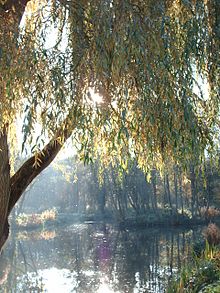Dilham is a village and civil parish in the English county of Norfolk. The village is located 4.3 miles south-east of North Walsham and 12 miles north-east of Norwich, and is situated on the River Ant.
| Dilham | |
|---|---|
 Dilham St. Nicholas' Church | |
Location within Norfolk | |
| Area | 6.55 km2 (2.53 sq mi) |
| Population | 319 2011 Census |
| • Density | 49/km2 (130/sq mi) |
| OS grid reference | TG332245 |
| • London | 110 miles |
| Civil parish |
|
| District | |
| Shire county | |
| Region | |
| Country | England |
| Sovereign state | United Kingdom |
| Post town | NORTH WALSHAM |
| Postcode district | NR28 |
| Dialling code | 01692 |
| Police | Norfolk |
| Fire | Norfolk |
| Ambulance | East of England |
| UK Parliament | |

History
editDilham's name is of Anglo-Saxon origin and derives from the Old English for a farmstead or homestead with an abundance of dill.[1]
In the Domesday Book, Dilham is listed as a settlement of 23 households in the hundred of Tunstead. The village was divided between the estates of Alan of Brittany, Robert Malet, Roger Bigod and St Benet's Abbey.[2]
Nearby Dilham Castle was built in the fifteenth century as a fortified manor house for Sir Henry Inglose, all that remains of the castle is the Grade II listed tower currently attached to Hall Farm.
Geography
editAccording to the 2011 Census, Dilham Parish has a population of 319 residents living in 164 households.[3]
Dilham falls within the constituency of North Norfolk and is represented at Parliament by Duncan Baker MP of the Conservative Party.
Dilham marks the limit of Broads navigation for larger boats, but smaller boats can continue on the North Walsham and Dilham Canal until Honing.
St. Nicholas' Church
editDilham's parish church was almost entirely rebuilt in the Twentieth Century, with the ruins of an Anglo-Saxon round-tower church attached. Despite this, the Medieval font and organ remain.[4]
War memorial
editDilham's war memorial takes the form of two carved marble plaques inside St. Nicholas' Church.[5] The memorial lists the following names of the fallen for the First World War:
- Lieutenant William J. Faulke (d.1918), 9th Battalion, Royal Norfolk Regiment
- Lance-Corporal Harold Fiske (1893–1918), 2nd Battalion, Essex Regiment
- Private Frederick W. Durrant (1892–1917), 7th Battalion, Border Regiment
- Private Arthur Morter (1886–1915), 1st Battalion, Essex Regiment
- Private Sidney Morter (1887–1915), 1st Battalion, Essex Regiment
- Private Lawson J. Dewing (1898–1919), 429th (Agricultural) Company, Labour Corps
And, the following for the Second World War:
- Bombardier Gilbert Hannant (1882–1942), 1st Regiment, Royal Horse Artillery
- Gunner Bertie W. Mortimer (1920–1944), 72nd (Anti-Tank) Regiment, Royal Artillery
- Private Basil A. Golder (1917–1942), 4th Battalion, Royal Norfolk Regiment
- Private Sidney H. Fiske (1918–1942), 6th Battalion, Royal Norfolk Regiment
- Private Alexander B. Simpson (1915–1940), 7th Battalion, Royal Norfolk Regiment[6]
References
edit- ^ "Key to English Place-names". kepn.nottingham.ac.uk. Retrieved 22 November 2024.
- ^ "Dilham | Domesday Book". opendomesday.org. Retrieved 22 November 2024.
- ^ "Custom report - Nomis - Official Census and Labour Market Statistics". www.nomisweb.co.uk. Retrieved 22 November 2024.
- ^ "The Norfolk Churches Site". www.norfolkchurches.co.uk. Retrieved 22 November 2024.
- ^ Salmon, J. (2022). Retrieved 23 December 2022. https://www.tracesofwar.com/sights/83528/War-Memorial-St-Nicholas-Church.htm
- ^ "Roll of Honour - Norfolk - Dilham". www.roll-of-honour.com. Retrieved 22 November 2024.
